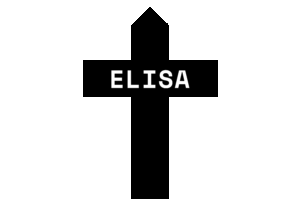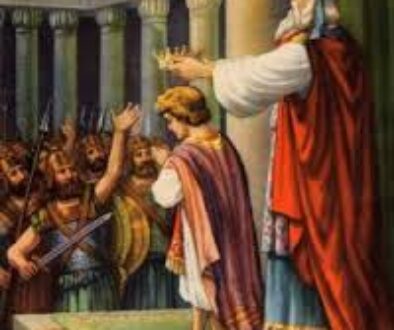2 Kings 13 Joash of Israel

Joash of Israel overlaps with Joash of Judah for two to three years. He also sees the death of Elisha and restores Israel through the hand of the Lord.
I didn’t realize that the two Joash’s shared time on the throne together. It is confusing to me, the counting backwards for dates in my chart of the kings. If I were thinking more clearly about the dates, I would have seen the overlap. So, this is the second group of kings that share the same name to share the same time on the throne. The other ‘name pair’, Jehoram/Joram shared most of their reign together. Today’s pair only overlap by two years, and very few interactions.
Joash of Israel honors the prophet Elisha as he is dying. He is also the deliverer that was the answer to Jehoahaz’s prayers. God was judging Israel’s sin, but He hadn’t thrown His hands up and said “Enough” yet. Let’s rejoin our journey and see where the Spirit takes us today.
♥ ♦ ♥
Joash of Israel stands in the throne room, looking out a window. It has been almost a month since his father died. The period of mourning is almost over. Joash is wondering where to go from here. Syria is still chipping away at Israel’s borders. All but the most serious incursions, Joash cannot afford to fight. Israel’s army is too small. As he looks out over the city, he begins to plan his list.
“The first thing I need to do is to rebuild the army. I can do nothing with the numbers as they are” Joash tells himself. “After that…” Joash has no idea what comes next. Until the army is rebuilt, there is no ‘next’.
Jehoahaz had sought the Lord because of the pounding the Syrians were inflicting on Israel. God didn’t come out and say it, but Jehoahaz knew that his prayers were heard. Joash is the answer to those prayers. Joash doesn’t even know this yet.
Joash works hard on rebuilding Israel’s army. He dedicates all the resources he can to training and feeding the men. He wants them in top fighting form, and empty stomach’s don’t make for strong warriors.
Three years into this process, Joash gets word that the prophet Elisha is dying. He drops everything and rushes to his side. He had not had personal visits from Elisha, but he knew that he represented God in Israel. “If Elisha dies, what will happen to us” wonders Joash.
Joash knocks gently on Elisha’s gate. Elisha’s servant comes to open it. He bows respectfully to the king.
“How is your master? Is he still living?”
“He is my king, and he told me that you were coming. I am to show you in at once.”
Joash is only half surprised by finding out that Elisha knew he was coming. Joash hadn’t told anyone his plan. But apparently God had told Elisha.
Elisha’s servant leads Joash into Elisha’s chambers. The room is stuffy and filled with the odor of illness. Elisha is pale and his face is drawn. His hair is white as snow and his veins can be seen through the backs of his hands. He is sitting propped up in his bed when Joash enters.
“Welcome my king” says Elisha says in a voice filled with weariness.
Joash falls on his knees beside Elisha’s bed. He feels death knocking on Elisha’s door. He cries out to him. “My father, my father! The chariots of Israel and its horsemen!” (2 Kings 13:14).
Elisha knows that Joash’s cry has two meanings. Yes. The Lord will soon be receiving his own body from this earth, but the king is in need of help with the earthly chariots and horsemen of Israel.
Elisha speaks to the second need. “Take a bow and arrows” (2 Kings 13:15), Elisha instructs Joash.
Joash doesn’t understand why Elisha is telling him to do this, and his face shows his confusion, but he rises and does exactly as Elisha instructed. Joash sees a bow and arrows lying on a nearby table. He walks over to them and points towards them. Elisha nods his head, and Joash brings them back to his bedside.
“Draw the bow” (2 Kings 13:16) Elisha instructs.
Joash pulls an arrow from the quiver and notches it on the bow string, then draws it back as though he was going to shoot it. Elisha nods. Joash holds the position for Elisha.
“Open the window eastward” (2 Kings 13:17a).
Joash steps over and opens the window. He immediately notices the fresh air coming in through it, along with a mild breeze. Before he has a chance to turn back to Elisha, Elisha says; “Shoot” (2 Kings 13:17b).
The king raises the bow and arrow and shoots the notched arrow out the window.
As the arrow leaves the bowstring, Elisha takes a deep breath and says; “The Lord’s arrow of victory, the arrow of victory over Syria! For you shall fight the Syrians in Aphek until you have made an end of them” (2 Kings 13:17c).
Joash looks out towards the path of the arrow. He used his full strength in pulling the bow and the arrow is gone from sight. He isn’t sure what to do next. Should he go and retrieve the arrow or let it be for now? Elisha takes his mind off the arrow that flew through the window with his next instructions.
“Take the arrows” (2 Kings 13:18a) Elisha says while looking at the arrows still in the quiver.
Joash follow’s Elisha’s gaze. He steps over and picks up the arrows from the quiver.
“Strike the ground with them” (2 Kings 13:18b).
Joash looks at the arrows in his hand, then takes them and strikes the ground with them three times. Then he looks up at Elisha.
Elisha becomes angry. The color in his face begins to rise. “You should have struck five or six times; then you would have struck down Syria until you had made an end of it, but now you will strike down Syria only three times” (2 Kings 13:19).
Joash wants to cry out, “I didn’t know!” but he knows it was too late. He has already done the deed. He will have to wait and see how the Lord work out his three victories. What he does do is kneel at Elisha’s feet again.
“My lord, Elisha. I am sorry I angered you. Thank you for giving me this message from the Lord. I will endeavor to do my best for Him in the victory he gives me.”
Elisha pats the king’s hand. “It is enough. Go your way with the Lord, as I am about to go mine.”
“What will become of Israel once you are gone? Will the Lord abandon us?”
Elisha gives Joash a scowl. “He has already said that He would be with you in battle. You need not fear that I am ‘taking Him’ with me when I leave this earth.”
“Of course. Thank you.”
“I am tired now. I need to rest. We will likely not see one another again in this life. Walk with the Lord King Joash as best as you can. And teach the people to do as well.”
Joash rises from the floor of Elisha’s room and makes his way out of the house. He keeps thinking about all that Elisha said. He wishes again he had understood why he was to strike the ground with the arrows before he had done it. He would have struck the ground until the arrows broke in his hands, had he known.
Before Joash even reached the palace, Elisha breathed his last. Elisha’s servant finds him in his bed a short time after Joash departed. He knows Elisha is finally at peace, but his spirit is heavy with grief. A sorrowful cry escapes his lips. He falls to his knees beside Elisha to honor him with one last kiss. Elisha’s servant gives him a gentle kiss on the back of his hand. He does not feel worthy to kiss this great man of God’s face.
After giving Elisha his final gift, the servant rises and sends word to the king and to all those who loved Elisha. “The man of God is now sleeps with his fathers.”
The news followed Joash into the palace. Joash sees a runner approaching as he was mounting the stairs. He stops and waits while the runner finishes closing the distance.
The runner bows before speaking. “My king, the man of God, Elisha, now sleeps with is fathers.”
Joash’s knees nearly give way as he realizes how close he came to missing out of the word from the Lord. And how ALL of Israel will mourn the loss of Elisha. He was not popular wit hall the people, but he represented the Lord to them like no other.
Joash sends a call out for the people to gather throughout Israel and pay homage to Elisha. He cannot wait for the people to gather though before burying Elisha’s body. Joash selects a small cave on the edge of Samaria where no one else has laid. Then he returns to Elisha’s house. With him, he brings the finest linen wrappings for Elisha’s remains.
Elisha’s servant washes him and warps him with the strips the king has provided. Joash has Elisha’s body moved to a cart. All those in Samaria who can attend, follow the cart, pulled by donkeys, to the mouth of the cave. Mourners wail the entire journey.
When they arrive, Elisha is taken into the cave and placed on a ledge. A stone is moved in place to cover the mouth of the cave. This portion of Israel’s service to the great man of God is done.
Two days later there is a solemn feast held in honor of Elisha. There are those who are glad he will no longer ‘trouble’ Israel, but the king is not among them. He silently prays that the Lord will send another to take his place. One who will call out to Israel and bring them closer to the Lord. He will honor the Lord as best as he can, within the confines of what has been set up before him. He regrets that he is not strong enough to tear down the golden calves of Jeroboam. He fears he would lose the people if he did. They might actually stone him to death for such an act.
Joash is expectant when Ben-hadad, King Hazael’s son, comes against him in Aphek. He remembers Elisha’s words regarding defeating him here. Israel marches out to face Ben-hadad with their newly trained army AND the hand of the Lord.
Ben-hadad is no match for Israel; especially when their God fights for them. Ben-hadad is sent scurrying from the battle field in terror. Most of his soldiers lay dead or near dead on the ground. Israel cut them down without a single loss of their own.
The men of Israel return to their homes singing songs of victory over the Syrians. This is just the beginning!
Joash faces Ben-hadad two more times with the same resounding result. He recaptures the cities King Hazael had taken from Israel. He did not completely destroy Syria at that time though, because of the words of Elisha.
Israel’s army continued to grow in numbers and in skill. During Joash’s twelfth year on the throne, Amaziah of Judah hired 100,000 men of Israel to fight alongside his own men. Amaziah paid 100 talents of silver for their services. Days before they were to go to battle, Amaziah sent them all home. “You are not to go out with us in battle.”
The men are angry. They don’t understand what is going on. “Why? What have we done to displease the king?” They receive no answer. They are ‘allowed’ to keep the money though, as a ‘gesture of good will’.
“‘Good will’ my back side” spits one of the main soldiers. He walks away shaking his head.
Amaziah of Judah defeats the forces of Edom and returns singing praises. He also brought with him the gods of Edom to set up for himself to worship. When the men of Israel who were sent home hear this, they became even angrier.
“He sends us home from a sure battle and carries home the spoils for himself. If we had gone, we would be carrying home the spoils.”
“So, let’s get some spoils” another man offers.
“How do you propose we do that?”
“By attacking the edge cities of Judah. Just like Hazael did to us.”
“I like that idea. I like it a LOT!”
From that moment on, Israel ‘bit’ at the edges of Judah and kept them on edge.
As Joash is in the spring of his fourteenth year of reign, Amaziah sends word to Joash to challenge him in battle. He is hoping that one decisive battle will end all these smaller skirmishes.
“Come, let us look one another in the face” (2 Chronicles 25:17) sends Amaziah.
Joash is not impressed with Amaziah’s words. He knows of Amaziah’s victories as well as his defeats. He sends a response right away.
“A thistle on Lebanon sent to a cedar on Lebanon, saying, ‘Give your daughter to my son for a wife,’ and a wild beast of Lebanon passed by and trampled down the thistle. You say, ‘See, I have struck down Edom,’ and your heart has lifted you up in boastfulness. But now stay at home. Why should you provoke trouble so that you fall, you and Judah with you?” (2 Chronicles 25:18-19).
Amaziah is incensed by Joash’s words. He musters his troops immediately had heads out to teach Joash who is the ‘tree’ and who is the ‘thistle’. Amaziah draws up into battle lines at Beth-shemesh, which belongs to Judah.
Joash draws up in battle lines against Amaziah and waits. Amaziah blows the trumpet to sound the war and both armies rush onto the battlefield. Israel immediately gains the advantage and begins dropping the men of Judah all around them.
Judah’s soldiers turn and flee from the battle and Amaziah is left completely exposed. Joash captures him alive. Rather than killing him, Joash takes Amaziah back to Jerusalem. Joash breaks down about 600 feet of the walls of Jerusalem. He and his men then pour into the city and go straight for the palace and Temple. Joash captures all the silver and gold and the treasures of the house of the Lord along with the treasury of the king. As a final insult, Joash leaves Amaziah in Jerusalem and takes captive his servants. These men he takes back with him to Samaria.
Joash returns home and reigns another two years before passing on from this life into the next. He is buried in Samaria and his son, Jeroboam, takes the throne in his place. Because Joash refused to abandon the gods the first Jeroboam set up for the people, he went to his fathers without truly reconciling with the Lord. The Lord considered him an evil king. He did not draw the people back to the Lord.
(to be continued)
Israel never does rid itself of the golden calves. They are her ultimate downfall. No matter how close they come back to the Lord, that one holdout still stands between them. That one sin that they won’t let go. And it is a MAJOR one to the Lord. It breaks ALL his commandments regarding relationship between man and Himself.
That is the same with us. If we let anything stand between us and God, it is our idol. We cannot hold onto an idol in one hand and the Lord in the other. God will NOT share His throne in your heart. And there is no TRUE relationship with Him until you clear everything else off HIS throne.
Something popped into my spirit as I was thinking about the Lord not sharing His place. I started thinking about the manger. Jesus was born in a stable because the world had no room for Him. And God allowed that in order to get the world’s attention. To show them what they were really missing. But He will share no more. He has to have the throne room now. Manger no more.
Father God, forgive me for all the times I have allowed something or someone else to occupy YOUR throne in my life. THANK YOU for helping me take them off right away. I PRAY that I never let anything take Your place again.




